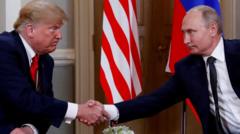In his bid for the U.S. presidency, Donald Trump promised to swiftly bring an end to the war in Ukraine, claiming confidence in his diplomatic prowess to resolve international crises. However, more than two months into his administration, the reality of negotiating peace has proven to be far more complex than anticipated. While Trump previously vowed to settle the conflict within 24 hours, he recently admitted that this was made with a hint of sarcasm, acknowledging the intricacies involved.
Struggles of Diplomacy: Trump's Challenges in Achieving a Ceasefire in Ukraine

Struggles of Diplomacy: Trump's Challenges in Achieving a Ceasefire in Ukraine
Donald Trump's attempts to swiftly resolve the Ukraine conflict face setbacks due to complex dynamics, geopolitical realities, and strategic miscalculations.
Critics point to several reasons for the stalled progress. First, Trump's belief in personal diplomacy may be misplaced; his conversations with Russian President Vladimir Putin have not yielded the immediate ceasefire he sought. Furthermore, Putin is resolute in addressing what he perceives as fundamental threats from NATO and Ukraine before discussing peace terms.
The U.S. strategy has also faltered, with initial pressures on Ukraine creating friction rather than facilitating dialogue. This miscalculation, along with the sheer complexity of the conflict itself, where logistics and understanding are crucial, has slowed negotiations. Moreover, Trump's focus on economic benefits through access to Ukrainian resources may have diverted attention from the urgent need to halt fighting.
Despite these challenges, Trump's engagement is acknowledged as a step forward, albeit a complicated and slow journey to peace. As negotiations continue in Saudi Arabia, the long road ahead highlights the difficulty in resolving a conflict that demands more than simple conversations and promises.
Negotiating peace, it seems, is rarely as straightforward as politicians might suggest.
The U.S. strategy has also faltered, with initial pressures on Ukraine creating friction rather than facilitating dialogue. This miscalculation, along with the sheer complexity of the conflict itself, where logistics and understanding are crucial, has slowed negotiations. Moreover, Trump's focus on economic benefits through access to Ukrainian resources may have diverted attention from the urgent need to halt fighting.
Despite these challenges, Trump's engagement is acknowledged as a step forward, albeit a complicated and slow journey to peace. As negotiations continue in Saudi Arabia, the long road ahead highlights the difficulty in resolving a conflict that demands more than simple conversations and promises.
Negotiating peace, it seems, is rarely as straightforward as politicians might suggest.





















